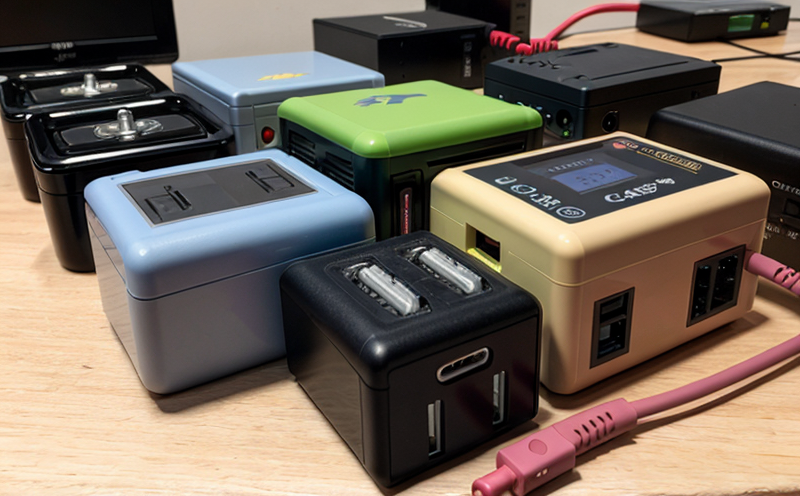Surface Temperature Testing of Batteries
Surface temperature testing is a critical aspect of ensuring battery safety and performance. This process involves measuring the maximum surface temperature that can be reached during various operational conditions. The test aims to identify potential hazards associated with overheating, which could lead to fire or explosion risks.
The primary focus of this service is on consumer products such as mobile phones, laptops, power tools, and other portable electronic devices where batteries play a crucial role. By adhering to international standards like IEC 62133 and UL 1973, we ensure that our testing meets the highest safety benchmarks.
The test procedure typically involves subjecting the battery or charger under controlled conditions to simulate real-world usage scenarios. These could include charging rates, discharge rates, ambient temperatures, and other environmental factors that may influence the battery's thermal behavior. The goal is to determine whether the battery can withstand these stresses without exceeding safe temperature limits.
Proper surface temperature testing helps manufacturers identify design flaws or material issues early in the development process. It also ensures compliance with regulatory requirements set forth by agencies such as the International Electrotechnical Commission (IEC) and Underwriters Laboratories (UL). For instance, IEC 62133-2 specifies that lithium-ion batteries should not exceed a surface temperature of 45°C during normal operation.
During testing, we employ advanced thermocouples or infrared cameras to monitor the battery's surface temperature accurately. These tools provide real-time data which allows us to pinpoint any areas where excessive heating occurs. This information is invaluable for improving product design and enhancing overall safety margins.
The test setup includes a controlled environment chamber capable of simulating different ambient temperatures, humidity levels, and charging/discharge cycles. Specimens are placed inside this chamber according to the prescribed protocol, after which various parameters such as voltage, current, and temperature are continuously monitored.
Once the testing is complete, detailed reports are generated containing all relevant data points along with recommendations for improvement if necessary. Our team of experts will work closely with you throughout the project to ensure that every aspect meets your expectations.
- IEC 62133-2:05 - Lithium-ion batteries should not exceed a surface temperature of 45°C during normal operation.
- UL 1973 - Provides guidelines for the safety testing and certification of portable electronic products containing rechargeable lithium cells or batteries.
Industry Applications
This service finds application across multiple industries including consumer electronics, automotive, medical devices, and aerospace. In the realm of consumer electronics, it is essential for manufacturers to demonstrate that their products meet stringent safety standards when exposed to various environmental conditions.
In automobiles, batteries are subjected to extreme temperatures during long drives or in hot climates. Surface temperature testing helps ensure that these components remain safe even under such challenging circumstances.
For medical devices, especially those used in critical care settings, it is imperative that they do not pose any risk of fire or explosion due to overheating. By incorporating surface temperature testing into their quality assurance processes, manufacturers can provide peace of mind to end-users.
In aerospace applications, where weight and power efficiency are paramount considerations, reliable battery performance becomes even more critical. Ensuring that batteries do not overheat during high-altitude flights or rapid altitude changes is crucial for maintaining safety standards.
Customer Impact and Satisfaction
Implementing surface temperature testing offers several advantages to our clients:
- Enhanced Safety: By identifying potential thermal hazards early in the development cycle, we help prevent accidents caused by overheating batteries.
- Regulatory Compliance: Adherence to international standards ensures that your products meet all relevant regulatory requirements.
- Better Product Design: Data from this testing can be used to refine product designs, leading to more efficient and reliable devices.
- Improved Reputation: Demonstrating a commitment to safety through rigorous testing enhances your brand's reputation among consumers and stakeholders alike.
Our clients report increased customer satisfaction due to the improved reliability of their products. They also benefit from reduced warranty costs and potential recalls associated with unsafe or malfunctioning batteries.
Frequently Asked Questions
International Acceptance and Recognition
The results of our surface temperature testing are widely recognized by regulatory bodies around the world, including the International Electrotechnical Commission (IEC) and Underwriters Laboratories (UL). Compliance with these standards provides a strong foundation for global market entry.
- IEC 62133-2:05 - Lithium-ion batteries should not exceed a surface temperature of 45°C during normal operation.
- UL 1973 - Provides guidelines for the safety testing and certification of portable electronic products containing rechargeable lithium cells or batteries.





